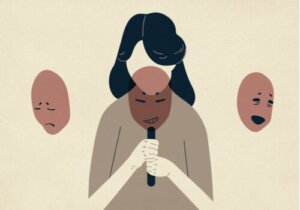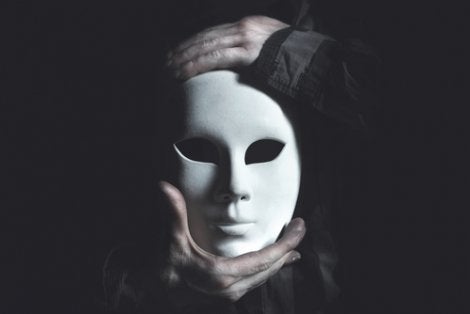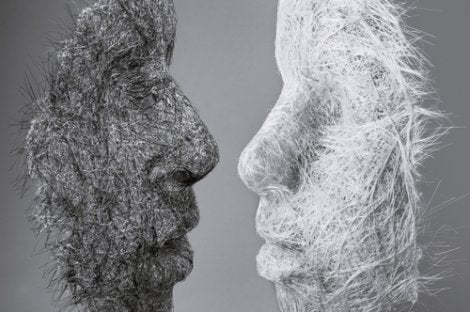What Masks Do You Wear?

Masks are tools people often use to adapt to their circumstances. It’s a way to reinvent yourself in order to move forward. They let you pretend that you’re capable of anything and help protect you from what you believe might hurt you.
In other words, putting on a mask is an unconscious defense mechanism that kicks in when you feel that you’re in danger. It’s the mechanism that can help you survive. Thus, wearing a mask isn’t always a bad thing.
That being said, in some circumstances, the mask that you’re wearing doesn’t fulfill its adaptive purpose. Instead, it does just the opposite. Those kinds of masks, the ones you can’t seem to take off even if you wanted to, have been the subject of many psychopathological studies. They’re known as the “ego” in Gestalt psychology or “cultural conserve” in psychodrama.

When do you need masks?
People learn to use masks from a very young age. In fact, you probably learned to use them when you realized that, in certain conditions, you couldn’t always do what you wanted if you wanted to be accepted.
For example, you learn that you should control your frustration or temper tantrums to get parental approval. Or that you should be patient and kind to your classmates so they’ll accept you.
These masks set the boundaries in your relationships with other people. They represent the different roles you need to play in your life. Masks allow you to check your impulses and help you develop important abilities such as empathy.
In fact, you probably wear some masks for yourself in certain situations. For example, you might need a mask of strength to overcome tough times. Once it’s served its purpose, you can take it off.
What kinds of masks do you wear?
Masks are a part of life. Some of them can save you, while others can harm you. What’s interesting about these masks is that different people tend to use the same ones.
Here are some of the most common ones:
- The good child. This child learned early on that others would accept them if they behaved. It’s hard for the good child to set boundaries or share their opinion because they’re scared they won’t be accepted. They simply try to satisfy others.
- The warrior. The tough battles people have to fight to overcome adversity create this mask. It helps push aside the fear and indecision that can creep in when they have to take charge.
- The apathetic mask. This mask of indifference makes you seem impervious to whatever is happening around you. It defends you against external threats as it allows you to hide your suffering.
- The savior. The savior needs to save everyone and loves lost causes.
- The sufferer. People who wear this mask learned early on that life is miserable and that the only way to get love is to play the victim.
- The tough guy. This is a very common mask that the most sensitive people put on because they’re afraid to be hurt or seem vulnerable. Due to that fear, they’ve learned to hide their sensitivity and only express anger or aggression.
- “Little miss sunshine”. Some people find it hard to accept emotions such as sadness, anger, or loss. Thus, they put a smile on their face and pretend that everything is fine. They run away from their feelings.
- The clown. The clown uses humor to hide from their emotions. This mask is similar to the previous one. One nuance of this mask is that people often think that others won’t accept them if they stop joking around all the time and act sincerely instead.

When you can’t take off a mask
All of the masks we mentioned above help you protect your true self from potential threats. Sometimes, though, you spend so much time wearing them that you can’t take them off. As a consequence, you don’t know who you are anymore. Is the mask part of your essence?
If you’re asking yourself that question, it means you’ve been wearing that mask for far too long. Thus, the mask that once protected you doesn’t work anymore. Now it’s just a barrier that cuts you off from your emotions, desires, and values. It’s like losing a part of who you really are. That disconnection can lead you down a slippery slope, where you try to use the same mask over and over again.
It’s very hard to take some masks off. For example, if you’ve been playing the tough guy, you might think that those around you won’t love you anymore as soon as they find out that you’re vulnerable.
At the end of the day, you should try to take all your masks off. Look at yourself in the mirror. See you who really are. Connect with your true self so you can love yourself. Until you can be authentic with yourself, you’ll have a hard time showing your true colors to anyone else.
Masks are tools people often use to adapt to their circumstances. It’s a way to reinvent yourself in order to move forward. They let you pretend that you’re capable of anything and help protect you from what you believe might hurt you.
In other words, putting on a mask is an unconscious defense mechanism that kicks in when you feel that you’re in danger. It’s the mechanism that can help you survive. Thus, wearing a mask isn’t always a bad thing.
That being said, in some circumstances, the mask that you’re wearing doesn’t fulfill its adaptive purpose. Instead, it does just the opposite. Those kinds of masks, the ones you can’t seem to take off even if you wanted to, have been the subject of many psychopathological studies. They’re known as the “ego” in Gestalt psychology or “cultural conserve” in psychodrama.

When do you need masks?
People learn to use masks from a very young age. In fact, you probably learned to use them when you realized that, in certain conditions, you couldn’t always do what you wanted if you wanted to be accepted.
For example, you learn that you should control your frustration or temper tantrums to get parental approval. Or that you should be patient and kind to your classmates so they’ll accept you.
These masks set the boundaries in your relationships with other people. They represent the different roles you need to play in your life. Masks allow you to check your impulses and help you develop important abilities such as empathy.
In fact, you probably wear some masks for yourself in certain situations. For example, you might need a mask of strength to overcome tough times. Once it’s served its purpose, you can take it off.
What kinds of masks do you wear?
Masks are a part of life. Some of them can save you, while others can harm you. What’s interesting about these masks is that different people tend to use the same ones.
Here are some of the most common ones:
- The good child. This child learned early on that others would accept them if they behaved. It’s hard for the good child to set boundaries or share their opinion because they’re scared they won’t be accepted. They simply try to satisfy others.
- The warrior. The tough battles people have to fight to overcome adversity create this mask. It helps push aside the fear and indecision that can creep in when they have to take charge.
- The apathetic mask. This mask of indifference makes you seem impervious to whatever is happening around you. It defends you against external threats as it allows you to hide your suffering.
- The savior. The savior needs to save everyone and loves lost causes.
- The sufferer. People who wear this mask learned early on that life is miserable and that the only way to get love is to play the victim.
- The tough guy. This is a very common mask that the most sensitive people put on because they’re afraid to be hurt or seem vulnerable. Due to that fear, they’ve learned to hide their sensitivity and only express anger or aggression.
- “Little miss sunshine”. Some people find it hard to accept emotions such as sadness, anger, or loss. Thus, they put a smile on their face and pretend that everything is fine. They run away from their feelings.
- The clown. The clown uses humor to hide from their emotions. This mask is similar to the previous one. One nuance of this mask is that people often think that others won’t accept them if they stop joking around all the time and act sincerely instead.

When you can’t take off a mask
All of the masks we mentioned above help you protect your true self from potential threats. Sometimes, though, you spend so much time wearing them that you can’t take them off. As a consequence, you don’t know who you are anymore. Is the mask part of your essence?
If you’re asking yourself that question, it means you’ve been wearing that mask for far too long. Thus, the mask that once protected you doesn’t work anymore. Now it’s just a barrier that cuts you off from your emotions, desires, and values. It’s like losing a part of who you really are. That disconnection can lead you down a slippery slope, where you try to use the same mask over and over again.
It’s very hard to take some masks off. For example, if you’ve been playing the tough guy, you might think that those around you won’t love you anymore as soon as they find out that you’re vulnerable.
At the end of the day, you should try to take all your masks off. Look at yourself in the mirror. See you who really are. Connect with your true self so you can love yourself. Until you can be authentic with yourself, you’ll have a hard time showing your true colors to anyone else.
This text is provided for informational purposes only and does not replace consultation with a professional. If in doubt, consult your specialist.







